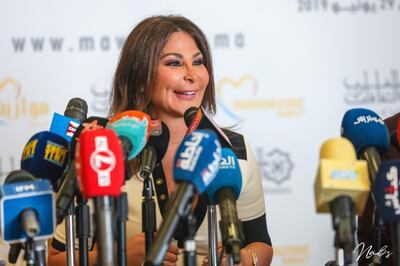Ever since revealing her battle with breast cancer last year, Elissa says she has seen the best and worst aspects of life in show business.
When the Lebanese singer opened up about her diagnosis in August last year, through the release of the single Ila Kol Elli Bihebbouni (To Those Who Love Me) whose accompanying music video had her re-enacting the scene where she received the news from the doctor, the support she received from her colleagues was heart-warming.
However, there were a times when shouldn't shake off the voices of the online trolls, who were cynical about her motives.
“There is not so much I can really say about these people,” she says.
“What I learned is to show empathy to them. They are probably going through challenges and if they were content with their own lives then they wouldn’t be sitting around posting these comments. May God help them, honestly.”

The Lebanese singer made the comments when meeting press at the Mawazine festival in the Moroccan capital Rabat on June 24, one day before her anticipated performance.
In addition to the widely reported treatment, which included both bouts of chemotherapy and psychiatric consultation, Elissa revealed that a side effect of her treatment was swollen hands.
"It became really intense and it was affecting me," she says.
“So I travelled to a hospital in Germany and underwent intensive treatment to remove that swelling and now it is back to normal.”
The Elissa effect
For someone whose self-assurance plays an integral role in both her craft and public image, Elissa says the nature of a cancer diagnosis, and subsequent treatment, taught her to live in the moment more.
And it also resulted in a few peers being brave enough to discuss their own human fragilities. This month, Lebanese singer Haifa Wehbe address concerned fans following an unusual absence from social media and string of cancelled public appearances.
In a Twitter post Wehbe wouldn't reveal her diagnosis but said it was a condition that she had "experiencing for more than a month".
“Keep me in your prayers,” she added in the post. “And if God is willing I will return soon. Thank God for everything.”
#عيد_مبارك ، ينعاد على الجميع.
— Haifa Wehbe (@HaifaWehbe) June 4, 2019
أعتذر عن غيابي وعدم مشاركتي بأي عمل فنّي أو ظهور إعلامي بسبب وعكة صحيّة أتعرض لها منذ أكثر من شهر ...خلوني بصلواتكم وإن شاء الله أعود لكم قريباً.
الحمدلله على كل شئ#eidmubarak
Egyptian star Tamer Hosny also revealed that he was admitted to hospital last October to undergo treatment on his strained vocal chords, while Lebanese singer Myriam Fares told press at the Mawazine on June 23 that she had overcome her own health scare similar to Hosny's condition.
Elissa says this is all a good thing and serves to humanise the artists who are often put on unhealthy pedestals.
“But at the same time, what I am against is people sharing this information to inspire pity,” she says. “I only revealed my condition after I became healthy again. I wouldn’t have done it while I was going through it. I did it at the end to encourage people to know about this condition.”
As part of her awareness campaign, Elissa became an ambassador for a breast cancer campaign in Lebanon last October, in addition to hosting a key session as part in the Dubai Health Forum in January where she discussed her treatment and subsequent healthy vegan lifestyle.
Work has begun on a new Elissa album
While happy to spread the message, Elissa says she has no plans to become a full time health advocate. Music remains her driving passion, she states, and she is already back in the studio with up to five songs recorded for a new album.
Discussing the new songs, Elissa says they won't be as unflinchingly personal as Ila Kol Elli Bihebbouni.
“That song wasn’t even meant to be that direct, by the way. I don’t normally work that way. I didn’t pick songs for my last album based on what I was going through in my personal life,” she says.
"When it comes to Ila Kol Elli Bihebbouni , I chose to do that song even before my diagnosis. But after I learned about my case, I realised that I had to do a video for this song in order to raise awareness about this health condition. It is always the subject matter that attract me to songs."
And this is perhaps where Elissa, despite what she thinks, has always been an advocate. Through her two decade-career, she released startling tracks that often discuss taboo subjects in Arabic societies.
These piercing songs include 2015's powerful Ye Meryati (My Mirror) which tackles under-reported cases of domestic violence in Lebanese homes, and 2017's A'aks Elli Shayfenya (The Opposite of What We See) in which she details the life of Lebanese dancer Dany Bustros, who committed suicide in 1998 after the death of her only son.
“I have never been concerned about discussing tough subjects. The key is finding the best way to talk about them. When it comes to the song about Dany Bustros, I did that song to show people the life they don’t see away from the limelight. The point is that we shouldn’t judge people because we don’t know what they are going through,” she says.
“While I am glad people enjoy my songs, I try to make sure that each one of them has a purpose.”







